In KP, a new wave of violence is erupting. Numerous attacks over the past few days have resulted in the deaths of numerous security personnel.
In a suicide attack in North Waziristan on Saturday, eight people, including four police officers and two security personnel, were killed. On Thursday night, militants stormed a checkpoint in Darazinda, which is in the D.I. Khan district, killing ten Frontier Constabulary officers. The attack, which was claimed by the banned TTP, was portrayed as “revenge” for a successful operation the day before, in which nine militants were eliminated by security forces, who have increased their efforts in response to the resurgence of terrorism.
Our troops should be extremely vigilant and prepared for any attack from the enemy at this time. They should also go after the enemy with the help of the civilian population who live in areas that are popular with militants and may be willing to help because they are tired of the constant violence.
Concern has remained with the rising number of security personnel killed in terrorist attacks. A 19-year-old off-duty cadet was one of the victims of the most recent attacks, which targeted a Lakki Marwat mosque. The young man is said to have fought off the terrorists and given his life while saving the lives of many others.
It is upsetting to think about the loss of a young life, and it makes one wonder how many more soldiers we will lose to such barbaric attacks before the state comes up with a coherent response mechanism to terrorist organizations, which are becoming more and more daring by the day. Due to the fact that Pakistan’s regular forces are trained and equipped for a different role and possess a different skill set, it has been argued that Pakistan needs a dedicated counterterrorism force to combat terrorists in asymmetric warfare. The recent uptick in violence has brought this need even more to light.
The province has recently experienced tension as a result of a three-way standoff between citizens, security forces, and terrorist organizations. People’s confidence in the state and its capacity to maintain peace and provide security for its citizens will further erode if recurrent acts of violence are not stopped.
As a result, the state must act quickly and decisively to regain control. It must consciously steer clear of any action or decision that could irritate the public and, as a result, obstruct the implementation of its policy measures.
In contrast, the province’s civilian leadership must assume responsibility for achieving political consensus regarding the threat’s response. To get rid of this threat, the nation needs to work together.



